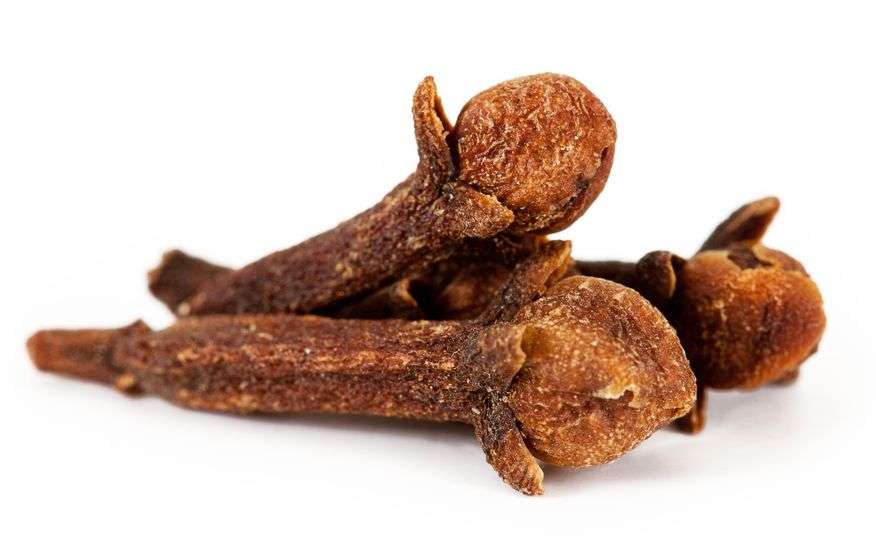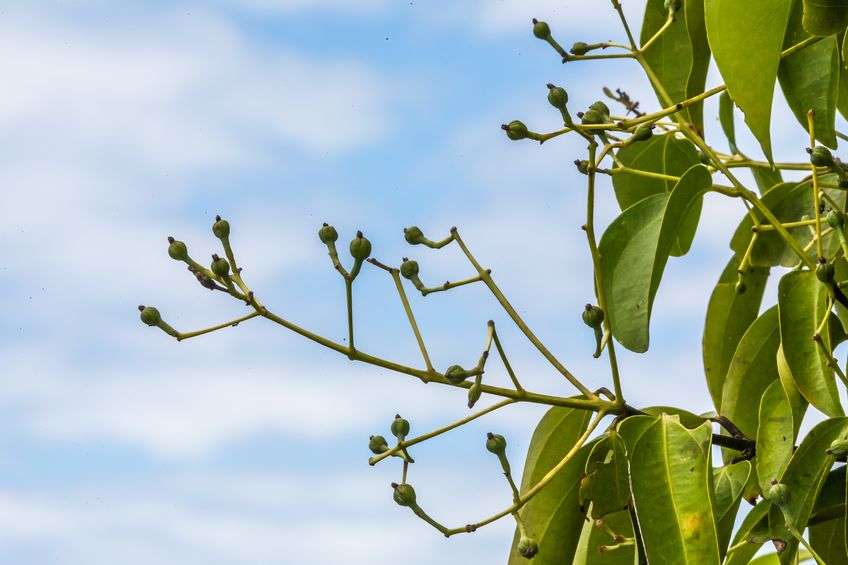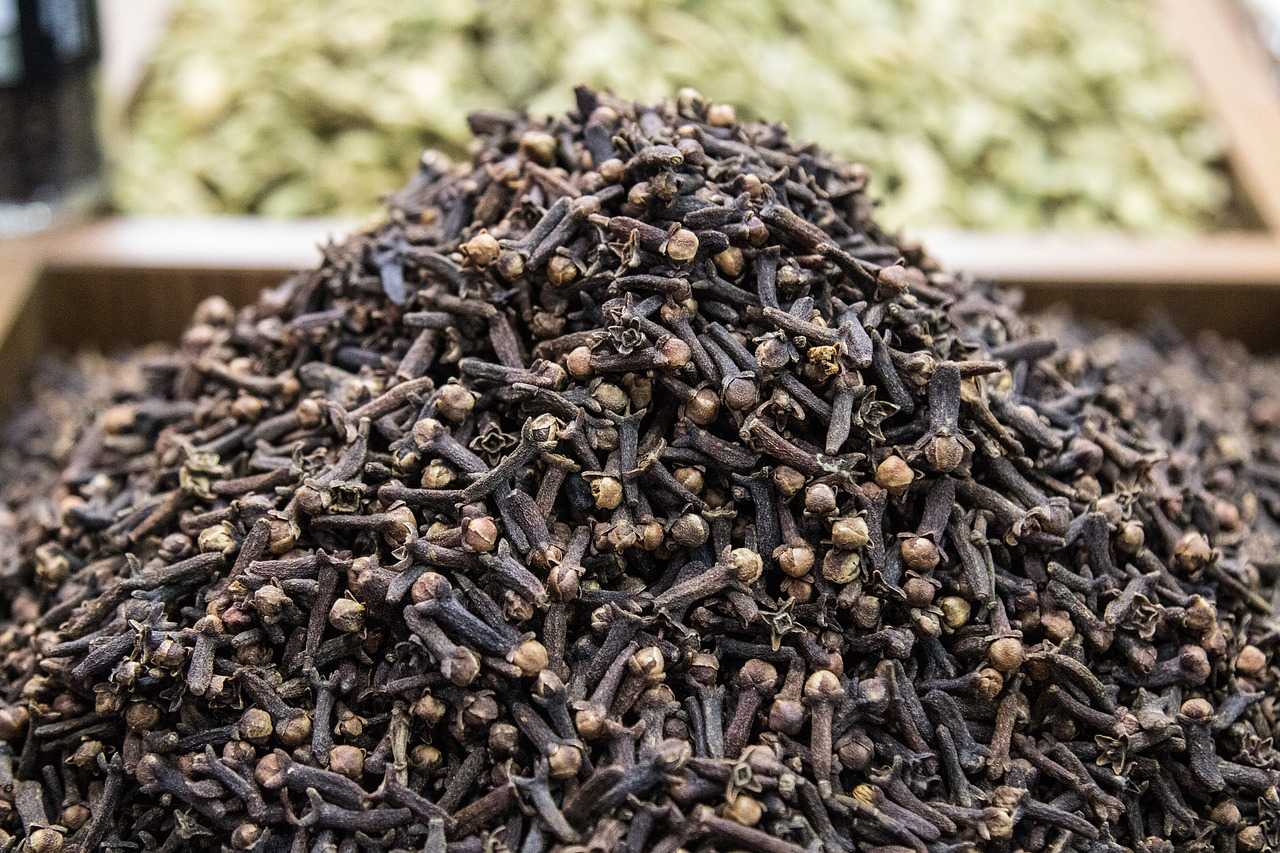
Aromatic, spicy and flavorful!
Do you love gingerbread or pumpkin pie? Spiced apple cider? Or chai tea? An ingredient these all share is clove. Cloves have a unique flavor which can be best described as is fruity, crisp and rather bitter. The distinctive flavor is mainly because of the eugenol content found in the essential oil.
What exactly is a clove? 
It's an unopened bud of the pink flowers of the evergreen clove tree. Their name comes from the Latin word “clavus,” which means “nail.” Why nail? A dried clove features a head with tapered stem, resembling a nail. Cloves are pink when fresh, however, they are almost always used once they have dried and turned brown.
The Latin name for cloves is Syzygium aromaticum.
They are in the Myrtaceae, or myrtle family. Myrtle, bay rum tree, clove, guava, allspice, and eucalyptus are some notable members of this group. All species are woody, contain essential oils, and have flower parts in multiples of four or five.
 Cloves are native to the Maluku islands in Indonesia. Both cloves and clove oil have been used in Asian cooking for over 2,000 years. Arab traders introduced cloves to Europe in the fourth century, and their pungent flavor was used in the Middle Ages to mask the sour or bitter taste of poorly preserved foods. Today, most cloves are grown in Zanzibar, in Eastern Africa.
Cloves are native to the Maluku islands in Indonesia. Both cloves and clove oil have been used in Asian cooking for over 2,000 years. Arab traders introduced cloves to Europe in the fourth century, and their pungent flavor was used in the Middle Ages to mask the sour or bitter taste of poorly preserved foods. Today, most cloves are grown in Zanzibar, in Eastern Africa.
The exciting history of cloves!
The Chinese have used clove for more than 2,000 years as a fragrance and spice. Cloves were brought to the Han dynasty of China from Indonesia as early as 200 BC. Back then, people would hold cloves in their mouths to improve breath odor during audiences with their emperor. The oldest recorded medical use of cloves, as early as 240 BC, comes from China, where it was used as a remedy for many different ailments, including diarrhea and hernia. It has been used traditionally to prevent nausea, for bad digestion, enhance blood circulation, to relieve hiccups and enhance liver function. And has long been considered to be useful for infections of both bacterial and viral nature.
Clove oil is widely used in aromatherapy. Clove oil is also be used for the artificial production of vanillin, the substance that gives the flavor of vanilla. The ancient Persians supposedly used clove oil as a love potion. Essential oils are obtained from the leaves, stems and flower buds of the clove-tree by steam distillation. The clove oil is a pale yellow liquid with a strong and spicy aroma.
With its long history, cloves have been considered....
anti-fungal, antibacterial, antiseptic and analgesic. They also contain anti-mutagenic and anti-microbial properties. Medicinally, the most studied compound found in cloves is eugenol. Eugenol is the primary component of clove's volatile oils. It functions as an anti-inflammatory substance. Clove also contains a variety of flavonoids, including kaempferol (also present in high levels in cruciferous vegetables), and rhamnetin (a metabolite, an antioxidant, and an anti-inflammatory agent). Both contribute to clove's anti-inflammatory (and antioxidant) properties.
Cloves are rich in antioxidants!
Clove's unsurpassed level of antioxidants includes a number of different antioxidant compounds. These include two very well-researched antioxidants, anthocyanins, and quercetin. Although most spices are excellent sources of antioxidants, cloves rank as the richest source of them all. Chemical analysis shows that cloves have at least 36 different ingredients, the most important being an essential oil called eugenol. Cloves also contain a variety of flavonoids which contribute to clove's abundant anti-inflammatory and antioxidant properties. 
But wait, there's more!
Cloves contain fiber, vitamins, and minerals. They are an excellent source of manganese, as well as dietary fiber, vitamin K, vitamin C, calcium and magnesium. According to the USDA National Nutrient Database, the nutrients found in cloves include carbohydrates, protein, energy, and dietary fiber. Minerals in cloves include potassium, calcium, sodium, and magnesium. The vitamins found in them include vitamin E, vitamin A, folate, and niacin. They also contain phosphorus, iron, zinc, thiamin, and riboflavin.
Clove may be used as a treatment for the following health benefits:
• Better Digestion
• Regulating Blood Sugar
• Liver Protection
• Diabetes Control
• Bone Preservation
• Promoting Youthful Skin
• Immunity Booster
• Supporting Headache Relief
• Oral Health
Now you know. Cloves, with their long history, are small but mighty!

If you'd like to check out some products that contains cloves, please visit these links:
Liver Detox by Professional Botanicals
Liver Detox plus Silymarin by Professional Botanicals
Digest by Professional Botanicals
An interesting story:
Clove oil was considered to be one of the main essential oils that protected people from getting the bubonic plague in Europe. A group of robbers was caught by the king and he asked them why they weren’t ill or dead from the plague exposure. They said it was because they covered themselves with this protective blend of oils (“thieves oil”), which included clove.
_______________________________________________________________________________________________
Note: The content of this article, and additional content on this website, are for informational purposes only and are not intended to be a substitute for professional medical advice, diagnosis, or treatment. Always seek the advice of a physician or other qualified health provider with any questions you may have regarding a medical condition. Never disregard professional medical advice or delay in seeking help because of something you read here on this website.


